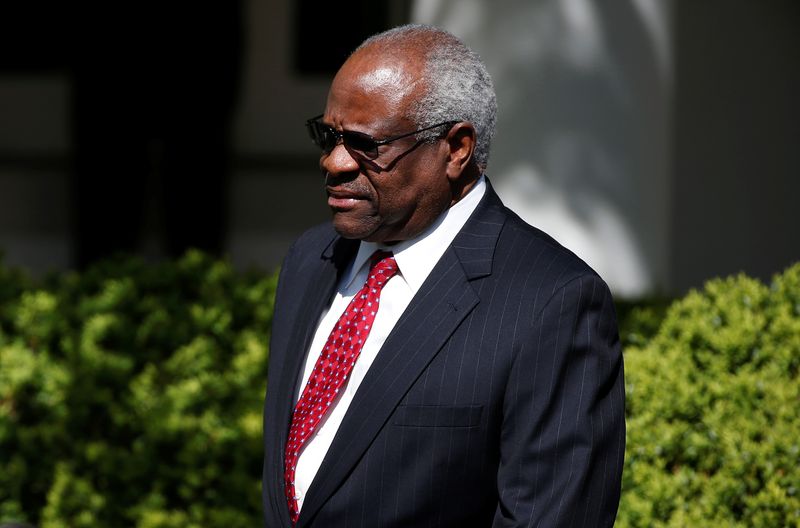Investing.com’s stocks of the week
By Richard Cowan
WASHINGTON (Reuters) - Clarence Thomas' career as a U.S. Supreme Court justice began following one of the most contentious confirmation battles in Senate history and 32 years later this conservative champion continues to draw controversy.
On Thursday, Senate Democrats called for an investigation after a report by ProPublica said the 74-year-old associate justice has spent decades taking luxury trips around the world financed by a Dallas businessman -- trips that were not disclosed under federal law.
On Friday, Thomas said in a statement that he was advised that the "personal hospitality" provided by Harlan Crow was not reportable under disclosure rules. But he said he would abide by new, tighter rules that recently took effect.
As one of the most conservative justices in a conservative-heavy Supreme Court, Thomas has been a lightning rod for liberals who have been frustrated by his rulings and his tone.
Just last summer, Thomas sparked an uproar on the heels of the Supreme Court overturning the landmark Roe v. Wade ruling, which established the right to abortion.
Amid outrage among Democrats in Congress, Thomas said Supreme Court precedents protecting rights to contraception, same-sex intimacy and gay marriage ought to be reconsidered in future cases.
Thomas, only the second Black justice to serve on the highest U.S. court, is known for not shying away from controversy, despite an almost Sphinx-like demeanor during Supreme Court sessions. Unlike most of his fellow justices, he is known for rarely taking part in aggressive questioning of lawyers arguing cases.
He has long rankled civil rights activists for his opposition to affirmative action in college admissions and hiring practices.
But nowhere was his steely constitution more on display than during his 1991 confirmation hearings conducted by the Senate Judiciary Committee. The proceedings were chaired by a then-49-year-old Democratic senator named Joe Biden.
Anita Hill, a Black law school professor who previously had worked for Thomas at the U.S. Department of Education and the U.S. Equal Employment Opportunity Commission, accused Thomas of workplace sexual harassment.
The all-white Judiciary Committee at the time pressed Hill on her testimony, forcing her to provide lurid details in nationally-televised hearings.
Thomas fought back, calling the proceedings "a circus" and "a national disgrace," adding that he was the victim of "a high-tech lynching for uppity Blacks."
In the end, the Senate confirmed Thomas in what was then an unusually close vote of 52-48.
Now, 32 years into his tenure and approaching former Justice William Douglas' longevity record of over 36 years on the bench, Thomas finds himself at the center of multiple controversies.
In addition to the ProPublica allegations, he is being urged to recuse himself from any potential cases involving former President Donald Trump's activities leading up to the Jan. 6, 2021, attack on the U.S. Capitol by Trump supporters trying to stop the formal certification of Biden's 2020 electoral victory.
Since November 2020, Trump, who is running for president in 2024, has falsely claimed he was the victim of massive voter fraud that helped Biden.
Thomas was the lone dissenting voice in January 2022 when the Supreme Court rejected Trump's request to block the release of White House records sought by the congressional committee probing the Jan. 6 attack.
In September 2022, Thomas' wife, conservative activist Virginia "Ginni" Thomas, met with the committee and reiterated her belief that the 2020 election was stolen from Trump, the panel's chairperson, Democratic Representative Bennie Thompson, told reporters.
She was called after the Washington Post and CBS News reported that she had urged Trump's chief of staff Mark Meadows to work to overturn the 2020 election results.
Ginni Thomas has previously denied any conflict of interest between her work as a activist and her husband's as a judge.
